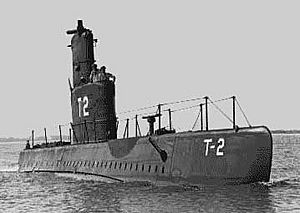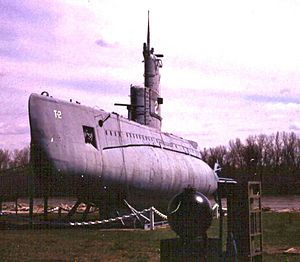USS Marlin (SST-2) facts for kids

USS Marlin (SST-2) in the late 1950s.
|
|
Quick facts for kids History |
|
|---|---|
| Name | USS Marlin (SST-2) |
| Namesake | As USS Marlin: The marlin, a large game fish |
| Builder | General Dynamics Electric Boat, Groton, Connecticut |
| Laid down | 1 May 1952 |
| Launched | 14 October 1953 |
| Sponsored by | Mrs. William R. DeLoach |
| Commissioned | 20 November 1953, as USS T-2 (SST-2) |
| Decommissioned | 31 January 1973 |
| Renamed | USS Marlin (SST-2), 15 May 1956 |
| Stricken | 31 January 1973 |
| Status | Museum ship, 20 August 1974 |
| General characteristics | |
| Class and type | T-1-class training submarine |
| Displacement |
|
| Length | 131 ft 3 in (40.01 m) |
| Beam | 13 ft 7 in (4.14 m) |
| Draft | 12 ft 2 in (3.71 m) |
| Propulsion | Diesel-electric, single screw |
| Speed |
|
| Complement | 2 officers, 16 enlisted men |
| Armament | 1 × 21 inch (533 mm) torpedo tube |
The USS Marlin (SST-2) was a special kind of submarine used by the United States Navy. It was originally called USS T-2 (SST-2). This submarine was in service from 1953 to 1973.
The Marlin was named after the marlin, a large and fast ocean fish. It was one of the smallest submarines ever built for the U.S. Navy. Its main job was to help train other sailors.
Contents
Meet the USS Marlin
The USS Marlin was a unique submarine. It belonged to the T-1-class of training submarines. These submarines were designed to be smaller. They helped the Navy practice important skills.
The Marlin was the second U.S. Navy submarine to carry the name of the marlin fish. Its small size made it special. It was much smaller than most other submarines.
Building a Submarine
The T-2 submarine started being built on May 1, 1952. It was constructed by the Electric Boat company. This company is located in Groton, Connecticut.
The submarine was officially launched into the water on October 14, 1953. Mrs. William R. DeLoach was its sponsor. This means she had the honor of christening the ship. The USS T-2 began its service on November 20, 1953.
Life at Sea: Training and Missions
After some initial tests, the T-2 moved to its home base. This was at Naval Station Key West in Key West, Florida. It started working in the waters near southern Florida and Guantánamo Bay, Cuba.
For about 15 years, the submarine was very busy. It served as a target for other ships and planes. It also helped train many sailors. The T-2 helped test new equipment and strategies. These were for finding and fighting submarines.
Helping Other Ships Learn
On May 15, 1956, the submarine got a new name. It became the USS Marlin. It continued its important training work. The Marlin often traveled to Guantánamo Bay. There, it helped the Fleet Training Group.
From 1963 onwards, the Marlin mostly acted as a target. It helped surface ships and aircraft practice. These units were learning how to detect submarines. This training happened at the Fleet Sonar School in Key West.
Special Missions
Besides training, the Marlin also took part in bigger operations. For example, in March and April 1965, it joined other submarines. These included its sister ship USS Mackerel (SST-1).
They worked with a special task force. Their mission was to practice mine warfare maneuvers. This helped the Navy learn how to use and avoid underwater mines.
A New Home: Becoming a Museum
The USS Marlin finished its service on January 31, 1973. Its sister ship, the Mackerel, also ended its service that day. Both submarines were officially removed from the Navy's list of active ships.
The U.S. Navy decided to give the Marlin a new purpose. On August 15, 1973, it was donated to become a museum ship.
On August 20, 1974, the Marlin found its permanent home. It was placed on display at Freedom Park in Omaha, Nebraska. Today, you can visit the USS Marlin there. It serves as a memorial submarine.
 | Sharif Bey |
 | Hale Woodruff |
 | Richmond Barthé |
 | Purvis Young |


